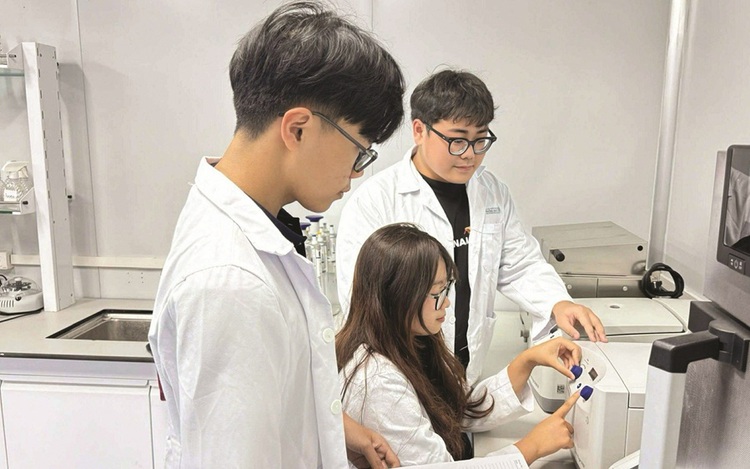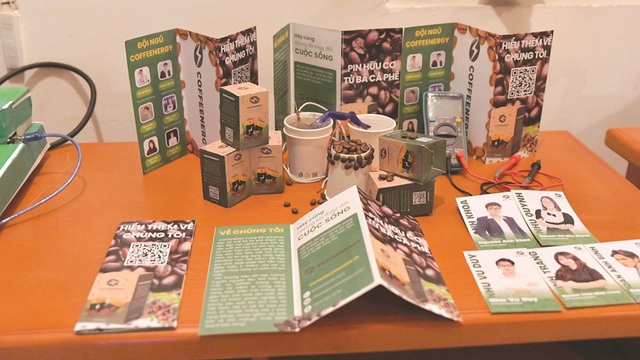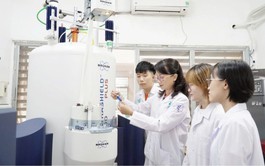
Students from VNU International School in the laboratory in a provided photo
Their bio-battery, made entirely from coffee waste, won first prize at the Innovative Idea – Startup Istartup 2025 competition. What makes the achievement remarkable is that most team members study economics, finance, or business administration, not engineering.
From waste to energy
Nguyen Anh Khoa, a finance and accounting student and the project's founder, said the team recognized the energy potential of coffee grounds because of their high carbon-rich organic compounds such as cellulose, hemicellulose, and lignin.
To be used as electrode material, coffee grounds must first be processed into activated carbon—a highly conductive, eco-friendly substance.
"Our design is based on the operating principle of bio-batteries, where microorganisms or enzymes break down organic compounds to generate electric current," Khoa explained.
The team was inspired by research from Professor Anne Zulfia Syahrial's group at the University of Indonesia, which developed lithium titanate oxide (LTO) batteries using activated carbon from coconut shells and graphite extracted from coffee grounds. That design reduced battery weight in electric vehicles from about 500 kg to 200 kg and cut charging time from two hours to just 30 minutes.
Finance and accounting student Nguyen Thi Minh Trang said the project followed a five-phase process: reviewing biomass battery research, collecting and processing coffee grounds, and performing pyrolysis to create biochar.
The resulting material was optimized for conductivity and used to fabricate electrodes coated onto copper foil before assembling the prototype.
"The battery can generate a stable voltage of nearly 3 volts under laboratory conditions—enough to power small electronic devices like digital clocks, sensors, or STEM models," Trang said.
The technology used is microbial fuel cell (MFC), where microorganisms decompose organic compounds in coffee grounds and release electrons that flow between two electrodes to produce electricity. This approach both reduces costs and repurposes agricultural waste.

Bio-battery prototype made from coffee grounds in a provided photo.
Challenges for non-specialists
Management student Doan Anh Binh said that although most members came from non-technical fields, they identified the project as a science and technology initiative from the start and learned the basics of chemistry and electrochemistry.
They consulted lecturers and experts in materials science to ensure accuracy at every stage. Initially, the group struggled with specialized English materials and understanding electrode structures but overcame these challenges through teamwork and close collaboration with mentors.
"Being economics students actually gave us an advantage in analytical thinking about feasibility, markets, and commercialization strategies," Binh said.
International business student Nhu Vu Duy added that the team partnered with VNU research units to verify their findings.
Material analysis and conductivity testing of the electrodes were conducted at VNU International School and the VNU University of Science, with support from materials science and renewable energy experts.
Significance and prospects
International business student Nguyen Thi Nhu Quynh said the team hopes their project inspires others to live sustainably and see value in waste.
"A tablespoon of coffee grounds isn't just leftover waste - it can become an energy cell powering electric vehicles, household appliances, or even a green city," she said.
"This is the philosophy of circularity: small actions leading to big changes."
Currently, the team's tests remain at laboratory scale, focusing on voltage, energy density, and biodegradability.
"Next, we plan to collaborate with key VNU laboratories for further validation and move toward meeting international commercialization standards," the team said.
They have also begun small-scale production and are exploring other biomass sources beyond coffee.
Dr. Ha Manh Hung, vice head of the Faculty of Applied Sciences at VNU International School and the project's supervising lecturer, said bio-batteries made from coffee grounds are a new concept in Vietnam but hold major potential for green technology.
He praised the students' dedication, saying they showed remarkable self-discipline and initiative despite their non-technical backgrounds.
"Despite still being experimental, the project's early results are very promising—especially if supported by future investment for deeper research," he said.



Max: 1500 characters
There are no comments yet. Be the first to comment.